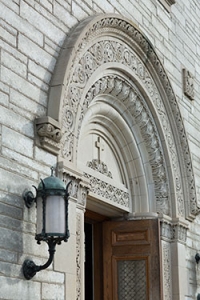
Chestnut Hill College is located at the northwestern edge of Philadelphia on 75 acres overlooking the Wissahickon Creek, and opened in 1924 as a Catholic, four-year, liberal arts college for women. Founded as Mount Saint Joseph College by the Sisters of Saint Joseph, the College was renamed in 1938.
Liberal Arts Education: Preparing Students for Life's Challenges
Since its inception, the College has offered a rigorous liberal arts education that provides students with a broad background in the humanities, social sciences and natural sciences. The goal of Chestnut Hill College has been to prepare students for life’s challenges by helping them grow intellectually, spiritually, emotionally and socially.
In keeping with the spirit of the Sisters of Saint Joseph, the curriculum has been modified over time to meet the ever-changing needs of higher education and society. The College originally awarded only the Bachelor of Arts and Bachelor of Science degrees to young women of traditional college age. In 1972, a Continuing Education department extended opportunities for undergraduate study to mature women and men. With the addition of a coeducational graduate program in 1980, the College began to offer master’s degrees and, in 1997, added its first doctoral program. Today, students may earn master’s degrees in four fields (psychology, education, human services and administration and cybersecurity) as well as a doctorate in clinical psychology.
Expansion Beyond the Physical Limits of the Campus
Academic changes also included expansion beyond the physical limits of the campus. As a member of SEPCHE (Southeastern Pennsylvania Consortium for Higher Education), Chestnut Hill pursues a collaborative approach to higher education with seven other local institutions. Through membership in the ACSSJ (Association of Colleges of Sisters of Saint Joseph), Chestnut Hill College offers its students opportunities to studying at seven other colleges in the United States, thereby enriching their educational experience. Study-abroad programs further extend the reach of a Chestnut Hill education and help prepare students for life in a global society.
College Goes Co-ed
November 2001 proved to be a historic time for Chestnut Hill College. The announcement that men would be admitted to the traditional-age, full-time undergraduate program in fall 2003 marked the end of the 78-year-old College for Women. In choosing to pursue this new direction, the College made a tradition of excellence and a history of success available to a wider audience.
SugarLoaf: The Campus Doubles in Size
On August 2, 2006, College President Carol Jean Vale, SSJ, Ph.D. announced one of the most transformational moments in the College’s history, the acquisition of the SugarLoaf estate from the Albert M. Greenfield Foundation. The purchase of SugarLoaf Hill offered the College a once-in-a-lifetime opportunity to nearly double the size of its campus and allow for expansion to accommodate a growing student body. The existing structures at SugarLoaf have all been renovated and are currently being used as classrooms , lodging for undergraduate students and space for conferences and social events. In the long-term, additional renovations will allow for more residential and academic buildings in accordance with the College’s Master Plan.
NCAA Division II Athletics
In August 2007, the College was reclassification from NCAA Division III to NCAA Division II and became a full member in the Central Atlantic Collegiate Conference (CACC). Chestnut Hill College has enjoyed unprecedented success in its athletics program.
Part of the National Register of Historic Places
The Chestnut Hill College campus provides an atmosphere conducive to teaching, learning and reflection for the entire College community. The decades of expansion in academic programs were matched by corresponding growth and change in the campus, which is listed on the National Register of Historic Places. For many years, the main buildings were St. Joseph Hall, with its five-story Greco-Roman rotunda and French Gothic exterior, Fournier Hall, a jewel of Italian Romanesque architecture, and Clement Hall, with its classrooms and athletic facilities. The additions of Logue Library, Fontbonne Hall, and Barbara D'Iorio Martino Hall have met the needs of a growing college community. In the fall of 2006, Mary Jackson Fitzsimmons '35 Hall opened as a residence hall to help alleviate a housing shortage on the campus.
Each new structure was carefully designed to preserve the architectural integrity of the campus while addressing specific educational and student life needs. The last decade has seen an emphasis on providing the technology that is essential to today's students. Renovated science facilities and computer laboratories helped to create a teaching/learning environment appropriate for the 21st century. Martino Hall includes "smart" classrooms and seminar rooms that are part of the campus-wide network. Visitors to the grounds have long enjoyed the grotto with its charming fountain, the House of Loretto, and the elegant main chapel that was inspired by Sainte Chapelle in Paris.
More than 11,000 Graduates
More than 11,000 individuals have earned degrees from Chestnut Hill College since 1924. The list of accomplished graduates includes numerous representatives in the fields of medicine, law, research, education, business and the social services. Alumni are also well known for their commitment to volunteerism in countless civic, cultural, educational, and religious organizations. Their spirit continues to animate the campus through the generous support of and dedication to their alma mater that they loyally demonstrate.
Faithful to its rich history, Chestnut Hill College will continue to meet the challenges of a changing society while maintaining its commitment to values-oriented education and its Catholic heritage. Future graduates of the College will continue to be people who use their education to transform the world as they join their predecessors in dedicating themselves to the College motto of Fides, Caritas, Scientia.





